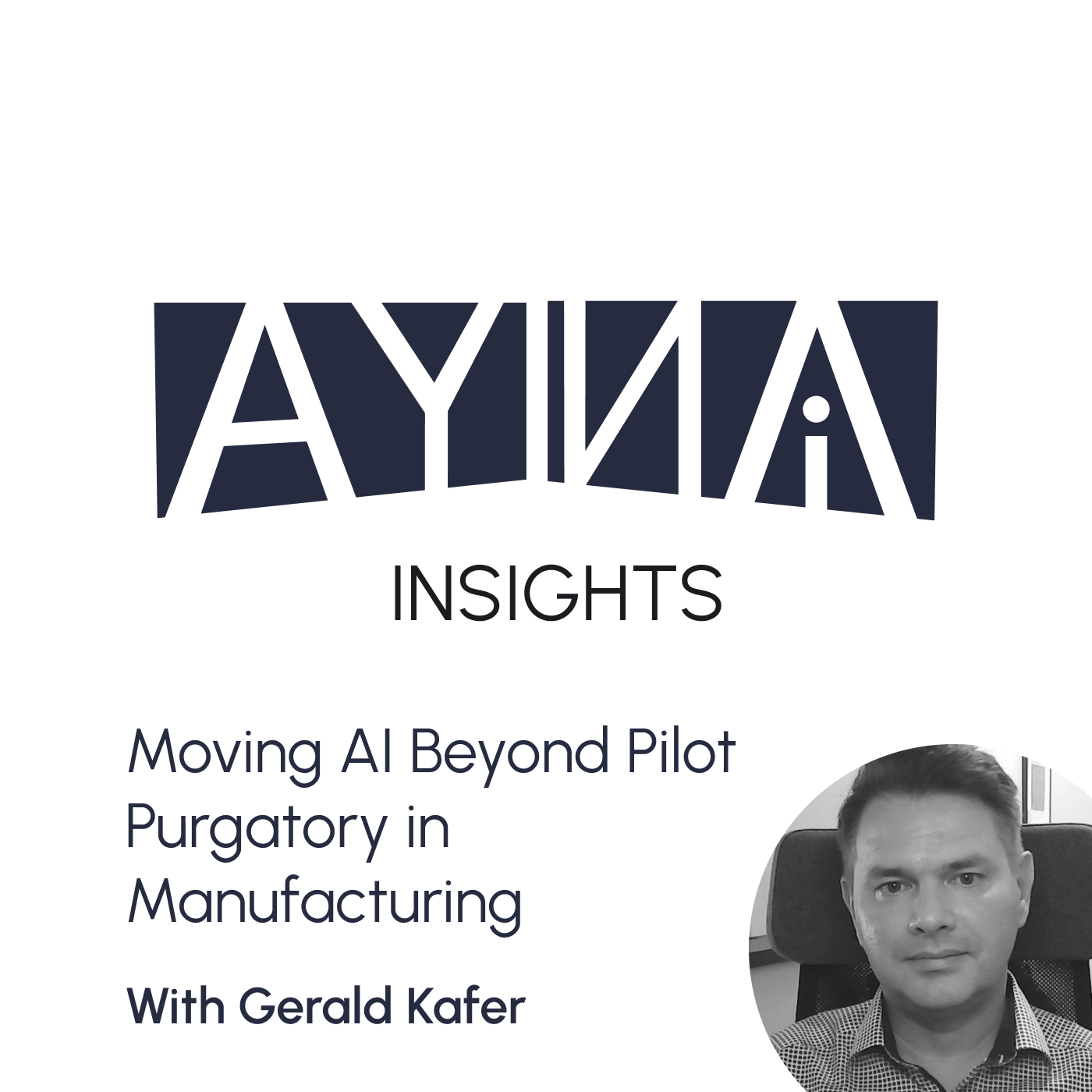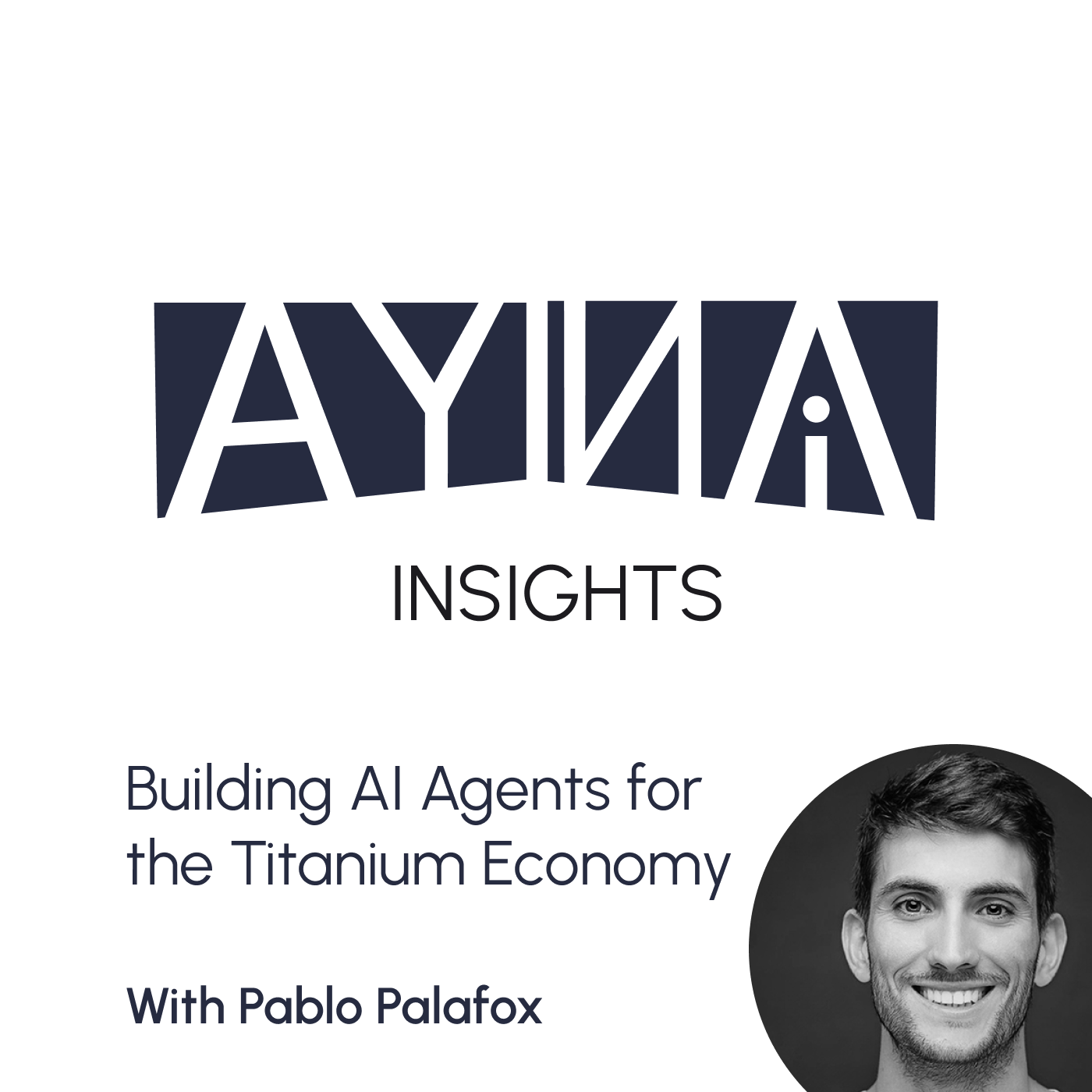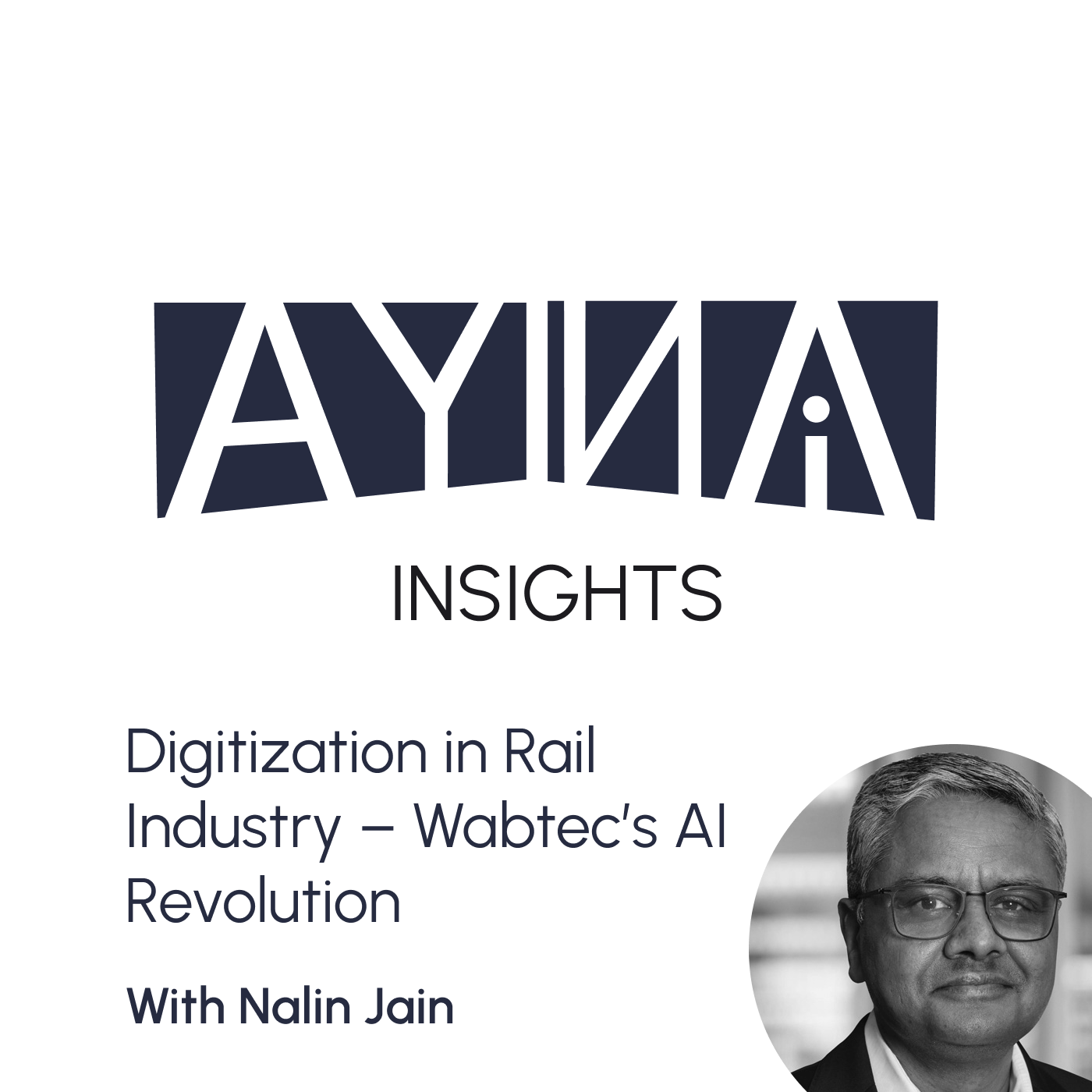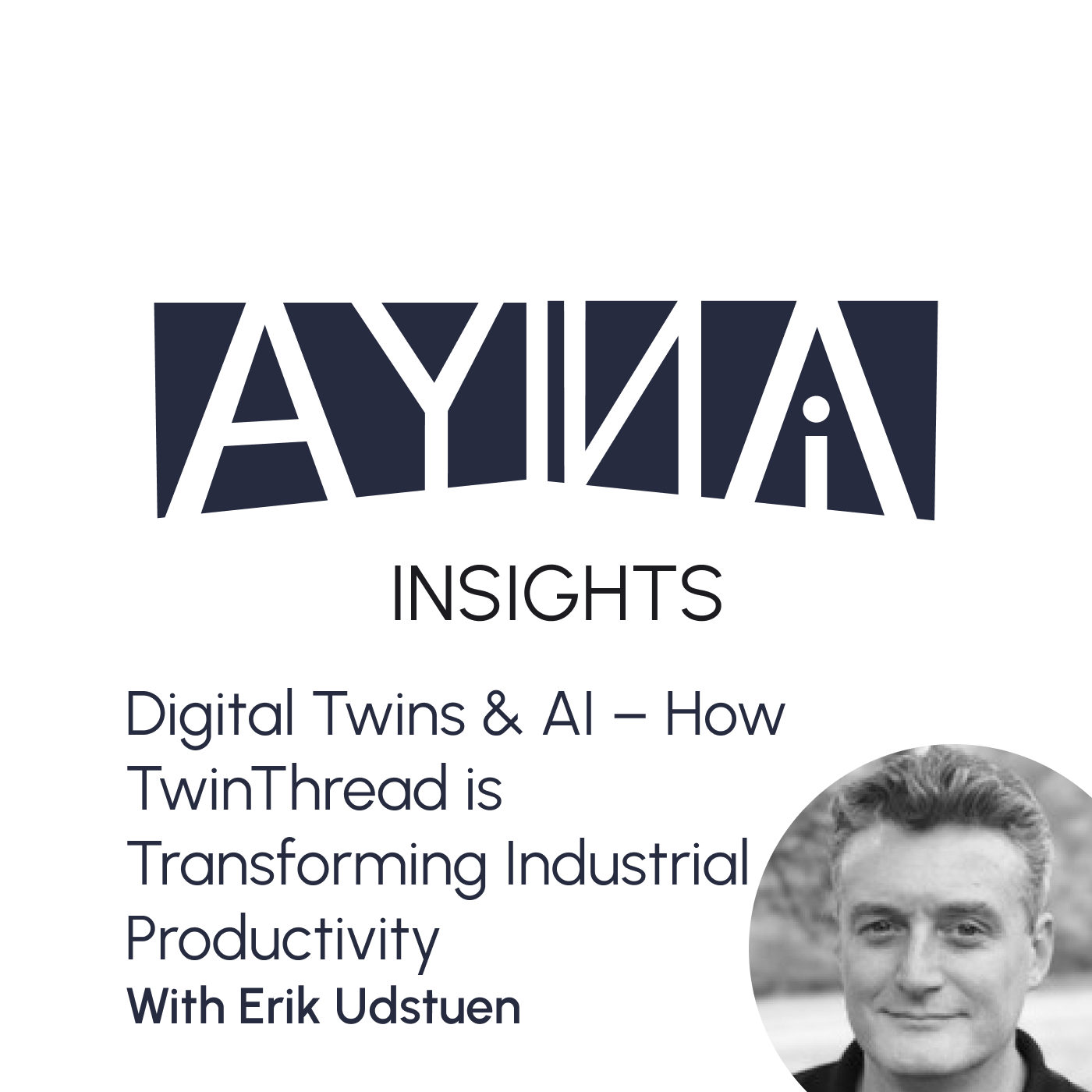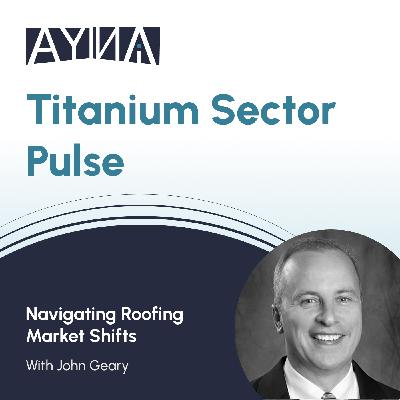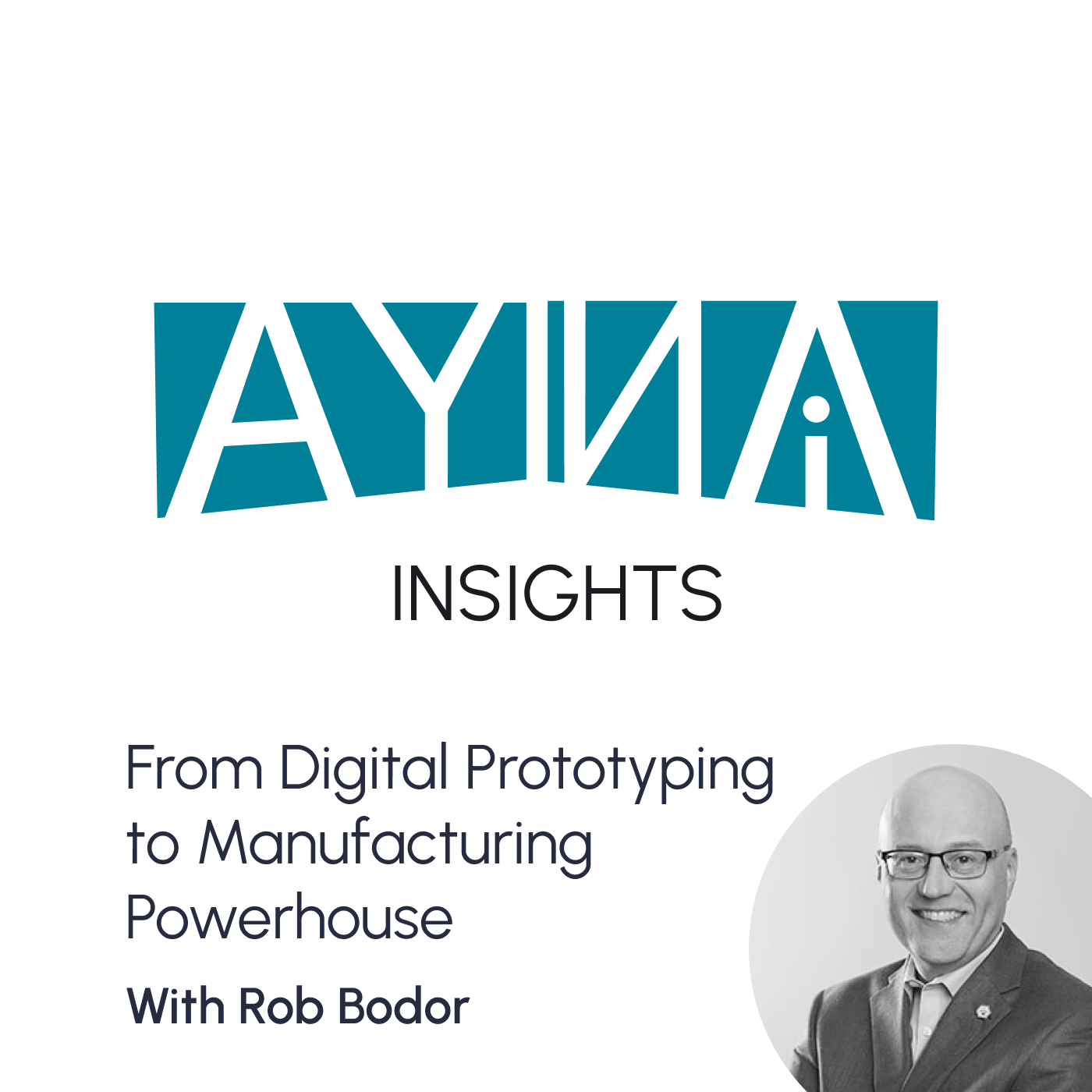Discover Ayna Insights
Ayna Insights

Ayna Insights
Author: Ayna.AI
Subscribed: 1Played: 8Subscribe
Share
© 2023 AYNA
Description
The Ayna Insights podcast features prominent leaders and influencers shaping the industrial and industrial technology sectors, discussing topics that are critical for executives, boards, and investors. Ayna Insights is brought to you by Ayna, a premier advisory and implementation firm in the industrial technology space, providing transformation and consulting services to its clients.
To learn more about Ayna, please visit our website at www.ayna.ai.
The views, information, and opinions presented in this podcast are solely those of the individuals involved and do not necessarily represent those of Ayna.AI or its affiliates. This podcast should not be considered financial or investment advice. Ayna.AI or its affiliates do not verify for accuracy any of the information contained in this podcast.
To learn more about Ayna, please visit our website at www.ayna.ai.
The views, information, and opinions presented in this podcast are solely those of the individuals involved and do not necessarily represent those of Ayna.AI or its affiliates. This podcast should not be considered financial or investment advice. Ayna.AI or its affiliates do not verify for accuracy any of the information contained in this podcast.
74 Episodes
Reverse
Ayna’s Mohit Jaju interviews Ed Dowling, CEO of Compass Minerals, on how 2025 tariff regimes are reshaping industrial supply chains. Ed notes that while Compass achieved USMCA compliance exemptions, secondary effects disrupted inbound supply chains, prompting a shift from sole- to multi-source strategies. He highlights market differentiation—high-value industrial products allowed tariff pass-through, while bulk municipal contracts resisted price changes, creating millions in opportunity costs. Ed calls for policy consistency, arguing that volatility deters investment while known risks can be managed—underscoring the need for constructive CEO–policymaker engagement and resilient supply chains.
Ed Dowling, CEO of Compass Minerals, brings 30+ years of global mining and minerals leadership, including CEO roles at SSR Mining and Meridian Gold, senior positions at De Beers and Cleveland-Cliffs, and board chair roles at Polyus and Copper Mountain Mining. He currently serves on Teck Resources’ board. A former U.S. Navy Petty Officer, Dowling holds bachelor’s, master’s, and doctoral degrees in mineral processing from Penn State, grounding his leadership in deep technical expertise across salt, lithium, magnesium, and plant nutrition markets.
Discussion Points
(00:00) Compass Minerals Overview – Ed Dowling leads Compass Minerals, producing salt, lithium, magnesium, and plant nutrition critical to infrastructure.
(01:39) 2025 Tariff Impact – Tariff uncertainty delayed expansion, though USMCA compliance exempted core products from direct exposure.
(04:32) Supply Chain Restructuring – Shifted from sole-source to multi-source networks to manage tariff-driven inbound disruptions.
(08:33) Cost Pass-Through Dynamics – High-value industrial products absorbed tariff costs; bulk municipal contracts resisted price changes.
(15:57) Policy and Leadership Insight – CEOs should engage policymakers for trade clarity; policy consistency enables investment and risk management.
Ayna is a premier advisory and implementation firm in the industrial technology space, leveraging a team of experienced leaders to help companies and investors drive performance improvement and value creation. The host of this episode Mohit Jaju is a President at Ayna.
For More Information
Compass Minerals Ed Dowling
Titanium Economy
Ayna.AI Website
Mohit Jaju
In this episode of AYNA Insights, host Dinesh Chopra, President of AYNA, speaks with Bob Merrill, a veteran building products executive with over three decades of leadership experience. Merrill shares his outlook on the industry, noting that housing starts remain below replacement levels despite signs of recovery. He discusses the impact of tariffs on pricing, especially for hardware and capital equipment—and stresses the need for execution excellence and operational discipline in volatile markets. Merrill also explains how recognizing “material arcs”—such as the rise of vinyl windows and fiberglass doors—can unlock growth opportunities. The conversation touches on leadership, talent development, and the increasing relevance of digital and direct-to-consumer channels.
Bob Merrill brings 30+ years of leadership in building products and industrial distribution. As CEO of Craft Master Manufacturing, he guided the company through the 2008–09 downturn before its sale to Jeld-Wen, where he later led a $2.4B North American sales and marketing organization. Today, he serves on the boards of Quaker Windows & Doors and North American Specialty Laminations, advising growth-focused firms through REM Consulting. His career reflects deep expertise in strategy, operations, and navigating market cycles.
Discussion Points
(00:00) Market Overview: Housing starts remain cyclical, oscillating between survival and growth, with demand holding steady despite high interest rates
(02:13) Industry Cycles & Demand Drivers: Sector recovery follows demographic trends, pointing to gradual growth toward replacement-rate levels
(07:08) Tariffs & Supply Chain Impact: Tariffs drive cascading price hikes across materials, while rising equipment costs strain project economics
(12:12) Leadership in Volatile Markets: Execution excellence and focus on controllable fundamentals define outperformers during downturns
(16:01) Material Innovation & Growth: Shifts in core materials—like vinyl and fiberglass—create new growth curves for early adopters
Ayna is a premier advisory and implementation firm in the industrial technology space, leveraging a team of experienced leaders to help companies and investors drive performance improvement and value creation. The host of this episode Dinesh Chopra is a President at Ayna.
For More Information
Bob Merrill LinkedIn
Ayna.AI Website
Dinesh Chopra LinkedIn
In this episode of the Titanium Economy Podcast, host Vineet Gupta speaks with Mike Slessor, President and CEO of FormFactor, about the transformation of semiconductor testing and innovation at the frontier of AI, photonics, and advanced packaging. Mike shares how FormFactor’s deep customer integration—where over a third of employees work directly with partners like Samsung, TSMC, Intel, and NVIDIA—drives precision, speed, and collaboration. He highlights key inflection points such as silicon photonics for energy-efficient data centers, high-bandwidth memory testing for AI, and the role of advanced packaging in extending Moore’s Law. He also discusses the company’s strategic U.S. expansion through a Texas brownfield acquisition following its divestiture of China operations, underscoring how geopolitics is reshaping the semiconductor value chain.
Mike Slessor has led FormFactor since 2014, guiding it to a $750M global leader in semiconductor test and measurement with 2,200 employees worldwide. A former CEO of MicroProbe (acquired by FormFactor), he began his career at KLA-Tencor. Mike holds a PhD in Aeronautics and Physics from Caltech and a BSc in Engineering Physics from the University of British Columbia. Under his leadership, FormFactor continues to pioneer next generation testing solutions powering the semiconductor industry’s most complex challenges.
Discussion Points
(01:37) Market Position & Portfolio: FormFactor’s probe cards enable wafer-level testing, while its systems business supports lab-to-fab transitions for next-gen technologies like quantum computing.
(03:29) Innovation & Customer Collaboration: Deep alignment with key customers drives sustained R&D investment. Engineering teams maintain daily collaboration with global semiconductor leaders.
(06:49) Technology Trends: 5G/6G, silicon photonics, and advanced packaging are reshaping the industry—improving data center efficiency and pushing Moore’s Law forward.
(15:25) Geopolitics & Manufacturing Strategy: Following its China divestiture, FormFactor is expanding U.S. production with a Texas facility to strengthen resilience amid shifting trade dynamics.
Ayna is a premier advisory and implementation firm in the industrial technology space, leveraging a team of experienced leaders to help companies and investors drive performance improvement and value creation. The host of this episode is Ayna's Vineet Gupta.
For More Information
Mike Slessor LinkedIn
Titanium Economy
Ayna Website
Vineet Gupta
In this episode, host Vineet Gupta speaks with Gerald Kafer, Solutions Manager and Technical Fellow at Siemens, on the practical realities of scaling AI in industrial operations. Kafer stresses the importance of pairing quick proof-of-value projects with enterprise-level infrastructure investments. He highlights that successful AI deployment hinges on strong OT-IT integration, continuous model management, and federated data governance. Viewing AI as a competitive advantage, Kafer believes empowered teams using AI tools will outperform those resisting change. His advice: start small with real use cases but build the standardized data foundations needed for long-term scale.
Gerald Kafer, Solutions Manager and Technical Fellow at Siemens, has over two decades of leadership in industrial digital transformation. From early research in neural networks and autonomic computing to pioneering Siemens’ corporate cloud journey with Microsoft Azure, Kafer has consistently bridged advanced technology and industrial applications. He helped establish Siemens’ edge computing frameworks within the Digital Industries CTO Office and now leads U.S. initiatives in AI deployment, edge infrastructure, advanced scheduling, and virtual commissioning for global manufacturing clients.
Discussion Points
(00:00) Gerald’s Journey at Siemens: Kafer reflects on his 20-year career at Siemens, evolving from early neural network research to cloud computing and now AI-driven industrial transformation.
(06:45) Implementing AI in Industrial Operations: He shares lessons on OT-IT convergence, continuous model management, and the need for strong data and cybersecurity foundations to scale AI effectively.
(12:11) Adoption Patterns and Post-COVID Shifts: Manufacturing adoption varies by equipment age and regulation; COVID-19 accelerated digitalization and refocused priorities on supply chain resilience.
(15:16) ROI and Emerging AI Applications: Predictive maintenance cuts unplanned downtime by 20% and maintenance costs by 25%. New frontiers include additive manufacturing, agentic systems, and production copilots.
(21:09) Scaling Beyond Pilots: Proof-of-value pilots using real data drive faster adoption. Sustainable success pairs quick wins with enterprise-wide infrastructure investment.
Ayna is a premier advisory and implementation firm in the industrial technology space, leveraging a team of experienced leaders to help companies and investors drive performance improvement and value creation. The host of this episode Vineet Gupta is a President at Ayna.
For More Information
Gerald Kafer LinkedIn
Vineet Gupta LinkedIn
Ayna.AI Website
In this episode of Ayna Insights, host Dinesh Chopra, President of Ayna, speaks with Joe Peilert, President and CEO of Veka Inc., on the challenges and opportunities shaping the building products sector. Peilert shares how interest rates, tariffs, and labor costs are impacting the industry, and highlights the need for long-term strategy, customer alignment, and operational agility. The conversation also explores product trends such as color preferences, impact performance, and outdoor living solutions, as well as the role of automation and geographic diversification in driving recovery and growth. Joe Peilert has led Veka Inc., a global leader in window and door systems, since 2010, steering its North American operations through post-crisis recovery and beyond. His career includes CEO of TMI, senior roles at Freberg, and EVP at Ardex, a global specialty building materials company. With an MBA from Ruhr University Bochum, Peilert has guided Veka through economic cycles while sustaining market leadership and advancing diversification initiatives.
Discussion Points
(00:00) Market conditions and interest rates weigh heavily on the building sector, demanding strategic responses.
(02:26) Tariffs shape capex and sourcing, while rising labor costs outpace material pressures.
(05:23) Diversification across geographies and products balances construction vs. renovation cycles.
(08:43) Capital goes to regional support and automation, with customized solutions driving differentiation.
(13:27) Leadership calls for long-term focus, customer closeness, and operational agility in crises.
Ayna is a premier advisory and implementation firm in the industrial technology space, leveraging a team of experienced leaders to help companies and investors drive performance improvement and value creation. The host of this episode is Ayna’s Dinesh Chopra.
For More Information
Veka Inc.
Joe (Joachim) Peilert LinkedIn
Dinesh Chopra LinkedIn
Ayna.AI Website
"Contrary to a lot of people's beliefs, I do believe that financial gain and strategic benefits - they go hand in hand." - Dong-Su Kim
Host Vineet Gupta sits down with Dong-Su Kim, CEO of LG Technology Ventures, to discuss corporate venture capital and emerging tech investments. Kim stresses that corporate VCs must deliver financial returns as well as strategic value, pushing back against the view that strategy comes at the expense of profitability. He highlights opportunities in enterprise AI for verticals, semiconductor infrastructure for AI, and the electrification wave beyond EVs. He also cautions against hype in consumer AI and LLMs, predicting consolidation ahead.
Dong-Su Kim leads LG Technology Ventures, managing nearly $900M across AI, biotech, cleantech, consumer, and enterprise tech. A Caltech physics graduate with a PhD in electrical engineering from Princeton, Kim has over 20 years in venture capital. He previously invested in 30+ companies at Samsung Ventures before founding LG Technology Ventures in 2018, bringing a rare blend of strategic and financial discipline to corporate VC.
Discussion Points
(00:00) Kim shares his journey from physics and semiconductor research to corporate venture capital
(00:03:18) Corporate VC eases fundraising and opens strategic partnerships while targeting solid returns
(00:09:47) Early-stage semiconductor bets hinge on market size and execution, with AI valuations both promising and risky
(00:15:11) Enterprise AI in verticals offers stronger upside than consumer apps, as LLM cost drops enable specialized solutions
(00:21:13) Electrification beyond EVs—spanning homes, industry, and infrastructure—presents the next big wave of opportunities
Ayna is a premier advisory and implementation firm in the industrial technology space, leveraging a team of experienced leaders to help companies and investors drive performance improvement and value creation. The host of this episode Vineet Gupta is President and Head of Semiconductors Practice at Ayna.
For More Information
Dong-Su Kim LinkedIn
LG Technology Ventures
Titanium Economy
Ayna.AI Website
Vineet Gupta
In this episode, Vineet Gupta, President and Head of Semiconductor at Ayna, speaks with Wahid Nawabi, Chairman, President & CEO of AeroVironment, on how the company is redefining defense tech through innovation and customer focus. Wahid highlights AeroVironment’s portfolio of unmanned systems, the Blue Halo acquisition, and advances in AI-driven autonomy. The conversation also touches on leadership, product development speed, and military-grade quality, with Wahid sharing his decade-ahead vision for the industry.
Wahid Nawabi has led AeroVironment for 15+ years, building it into a full-spectrum defense technology prime. With prior leadership roles at American Power Conversion, he brings cross-sector experience. Under his watch, AeroVironment has driven new categories like loitering munitions, executed strategic acquisitions, and sustained innovation investments of 12–13% of revenue while scaling production.
Discussion Points
AeroVironment’s Defense Leadership – Established as a leading multi-domain defense technology provider, with a focus on integrating unmanned systems and AI capabilities
Engineering Legacy & Innovation – With seven vehicles in the Smithsonian, AeroVironment combines heritage with rapid development cycles and sustained R&D investment
Building High-Performing Teams – Success comes from balancing freedom to experiment with mission-driven discipline, while preserving culture and employee engagement
Comprehensive Solutions – From underwater robotics to space communications and cyber, strategic acquisitions close capability gaps and strengthen the tech portfolio
Military-Grade Reliability – Meeting exponentially higher standards than consumer tech, with advanced autonomy powered by proprietary annotated datasets in computer vision
Ayna is a premier advisory and implementation firm in the industrial technology space, leveraging a team of experienced leaders to help companies and investors drive performance improvement and value creation. The host of this episode Vineet Gupta is a President at Ayna.
For More Information
Aerovironment
Wahid Nawabi LinkedIn
Titanium Economy
Ayna.AI Website
Vineet Gupta
"I would urge folks to at least look at what parts of their business could benefit from some form of automation." - Pablo Palafox
In this episode, Parthesh Shastri speaks with Pablo Palafox, Co-founder and CEO of Happy Robot, about how AI agents are transforming industrial operations — from automated supplier coordination to self-correcting autonomous workflows. Pablo shares his journey from computer vision research to building voice-first AI platforms and explains why industrial leaders need to start deploying AI now as adoption cycles shorten and ROI becomes clear.
Pablo holds a PhD in Computer Vision from TUM and previously worked on autonomous systems at Meta’s Reality Labs. At Happy Robot, he now leads a platform that serves 60+ enterprise customers — including several Fortune 500s — with multi-channel AI automation across freight and supply chain communications.
Discussion Points
Pablo shares how his background in robotics and AI research (inspired by his brother) led him to focus on deep learning.
The team pivoted after Y Combinator, uncovering communication pain points in freight through Javi’s CFO experience.
Happy Robot stood out by prioritizing voice-first AI agents and later expanded to multi-channel capabilities.
Enterprise sales cycles have accelerated as industrials see AI’s value, with customers realizing 100x+ ROI in areas like payment collections.
AI agents are shifting from structured workflows to autonomous, self-correcting systems — and industrials need to act now to stay ahead.
Ayna is a premier advisory and implementation firm in the industrial technology space, leveraging a team of experienced leaders to help companies and investors drive performance improvement and value creation. The host of this episode is AYNA’s CTO – Parthesh Shastri.
For More Information
Pablo Palafox LinkedIn
Pablo Palafox X
Happyrobot.ai
Ayna.AI Website
"A digital champion isn’t someone who knows how AI works. It’s someone who knows where to apply it.." - Anu Khare
In this episode of our Titanium Economy series, Parthesh Shastri sits down with Anu Khare, CIO of Oshkosh Corporation, to unpack how industrial manufacturers can win with digital. Anu shares Oshkosh’s human-centered approach to transformation—grounded in co-creation, phased implementation, and a sharp focus on business value. He outlines the company’s three-layer digital architecture and explains why supply chain optimization offers the biggest ROI, while finance remains an untapped opportunity. The conversation also covers building digital champions, adapting to workforce shifts, and preparing for a tech-enabled industrial future.
Anu Khare has led Oshkosh’s digital transformation since 2018, driving initiatives across AI, advanced analytics, ERP modernization, and Industry 4.0. Under his leadership, the team has earned seven consecutive CIO 100 Awards and was named a finalist for the MIT Sloan Leadership Award. Prior to Oshkosh, he held senior roles at Koch Industries and United Technologies. An IIT Roorkee graduate, Anu brings more than two decades of experience in tech-driven industrial change.
Discussion Points
(01:17) The three pillars of digital transformation: value, scale, and cybersecurity
(03:15) Why aligning with business goals—and co-creating with users—makes change stick
(04:27) Inside Oshkosh’s 3-layer tech stack: from transactions to predictive intelligence
(18:53) Labor gaps and Gen Z expectations are fast-tracking industrial digitization
Ayna is a premier advisory and implementation firm in the industrial technology space, leveraging a team of experienced leaders to help companies and investors drive performance improvement and value creation. The host of this episode is AYNA’s Parthesh Shastri.
For More Information
Anu Khare LinkedIn
Oshkosh Corp
Ayna.AI Website
Titanium Economy
Parthesh Shastri LinkedIn
"Technology isn't the barrier - adoption is the key challenge facing industrial leaders today." - Nalin Jain
In this episode, Ayna’s Parthesh Shastri speaks with Nalin Jain, Group President of Digital Intelligence at Wabtec Corporation, about the digital transformation sweeping the rail and mining industries. Nalin details how Wabtec, a 150-year-old industrial leader, is leveraging AI, machine learning, and digital solutions to improve safety, efficiency, and sustainability. He highlights innovations like Trip Optimizer, which has helped save 752 million gallons of fuel and cut emissions by up to 25%. The discussion underscores the shift from physical to digital product management and the importance of customer-centric innovation in navigating industrial digitalization. Nalin also emphasizes that technology adoption—not availability—is the biggest hurdle, advocating for AI as a tool to augment human capability.
Nalin Jain brings extensive global experience to his role, overseeing digital and mission-critical control systems across railroad, mining, and port operations at Wabtec. He joined the company in 2019, initially leading the global equipment business before taking charge of its digital transformation efforts. With a mechanical engineering degree from National Institute of Technology, Surat and an MBA from Indian School of Business, Hyderabad, Nalin previously held leadership roles at GE, including CEO of GE Aviation and GE Transportation in South Asia. His expertise spans industrial technology, international business, and strategic digital innovation, making him a key voice in shaping the future of intelligent industrial systems.
Discussion Points
(00:00) Nalin Jain introduces Wabtec’s 150-year legacy and how digital intelligence is transforming rail and mining operations.
(01:16) Wabtec builds autonomous locomotives and software for coordinating trains across complex networks.
(03:59) Safety is critical in long-haul operations; efficiency boosts capacity and digital tools drive emissions cuts.
(07:13) Machine learning now powers predictive maintenance, with AI enhancing—not replacing—human roles.
(12:08) Digital tools cut emissions by 20–25%; Trip Optimizer alone has saved 752 million gallons of fuel.
(16:48) Global experience highlights the need for local adaptation; customer focus and curiosity fuel innovation.
Ayna is a premier advisory and implementation firm in the industrial technology space, leveraging a team of experienced leaders to help companies and investors drive performance improvement and value creation. The host of this episode is AYNA’s Parthesh Shastri.
For More Information
Nalin Jain LinkedIn
Wabtec Corp
Ayna.AI Website
Titanium Economy
Parthesh Shastri LinkedIn
“Data is not just a reporting tool; it's now a strategic asset. It's the key to everything.” - Jeff DeSandre
In this episode of our Titanium Economy series, host Parthesh Shastri speaks with Jeff DeSandre, former CIO at Harrington Process Solutions and America Royal, about digital transformation in industrial settings. DeSandre emphasizes the importance of starting with clear business outcomes and a strong data foundation—particularly around master data management. He shares practical strategies for modernizing legacy systems through hybrid architecture using API gateways and microservices and explains how metrics like inventory accuracy and freight cost optimization can clearly demonstrate transformation value.
With decades of IT leadership experience, DeSandre now serves as a Fractional CIO and Principal Consultant at CatalystCIO, advising mid-sized enterprises on digital strategy. His expertise spans legacy system integration, cybersecurity, cloud architecture, and strategic data analytics. At both Harrington and America Royal, he led complex ERP implementations, drove IT strategy during M&A, and built modern technology frameworks that delivered measurable business impact across the industrial sector.
Discussion Points
(01:30) Digital Transformation & Legacy Systems – DeSandre stresses the need for clear business goals and strong data visibility, advocating API gateways and microservices to modernize without disrupting operations.
(04:50) Measuring Success & Avoiding Pitfalls – He shares how his team boosted inventory accuracy by 90% and warns against overlooking master data and security in digital initiatives.
(08:38) IT's Strategic Role & Staying Current – DeSandre discusses IT’s shift to a strategic function and his methods for staying up to date—daily research, vendor input, and tool evaluation.
(11:58) Cloud & AI in Industrial Environments – He recommends a hybrid cloud approach starting with analytics and CRM and urges leaders to grasp AI fundamentals before rollout.
(15:45) High-Impact Tech & CIO Advice – From EDI to process mining, DeSandre highlights valuable tools and advises new CIOs to listen, build trust, secure quick wins, and align closely with strategy.
Ayna is a premier advisory and implementation firm in the industrial technology space, leveraging a team of experienced leaders to help companies and investors drive performance improvement and value creation. The host of this episode is Anya’s Parthesh Shastri.
For More Information
Jeff DeSandre LinkedIn
Catalyst CIO
Ayna.AI Website
Parthesh Shastri LinkedIn
"There is a need for starting automation - robotics is a space that we can't postpone for too long. We want to make sure that you start adopting it." - Rishabh Agarwal
In this episode, host Parthesh Shastri speaks with Rishabh Agarwal, CEO and co-founder of Peer Robotics, about rethinking automation for small and mid-sized manufacturers. Drawing from his experience at Kuka, Siemens, and a family manufacturing background, Rishabh shares how Peer’s collaborative robots learn from human demonstrations—no coding required. He explains how their robots are designed to work with people, often elevating workers to more valuable roles, and encourages manufacturers to adopt automation gradually using tech that fits existing systems and is easy for non-technical users.
Rishabh Agarwal, an alumnus of IIT Delhi and the University of Maryland, combines academic rigor with practical insight. At Peer Robotics, he leads a lean, R&D-focused team building intuitive robots that simplify material movement on the factory floor. Backed by significant funding, the company prioritizes accessibility over sales infrastructure, empowering more manufacturers to embrace collaborative automation.
Discussion Points
(04:11) Rishabh shares how their robots learn routes via human demonstration, eliminating reprogramming. He also explains Peer’s R&D-first approach, keeping dev and deployment teams closely aligned for rapid iteration.
(09:09) From IIT Delhi to the University of Maryland, and stints at Siemens and Kuka, Rishabh reflects on his journey into robotics and how SMEs face unique automation hurdles due to their need for flexibility.
(16:38) Peer’s automation strategy centers on plug-and-play integration, minimal user input, and intuitive interfaces. Their team handles complexity internally to deliver streamlined, infrastructure-light solutions.
(22:36) Rishabh discusses how automation at Peer augments jobs rather than displacing workers, often promoting operators into new roles. He urges manufacturers to start small, enabling low-risk, scalable adoption.
Ayna is a premier advisory and implementation firm in the industrial technology space, leveraging a team of experienced leaders to help companies and investors drive performance improvement and value creation. The host of this episode is Anya’s Parthesh Shastri.
For More Information Rishabh Agarwal LinkedIn
Peer Robotics
Ayna.AI Website
Parthesh Shastri LinkedIn
"Experience tells you where you've been, character tells you where you're going." - George Randle
What can manufacturing leaders learn from military leadership? In this episode of the Titanium Economy podcast, George Randle—Army veteran, talent strategist, and co-author of The Talent War—joins host Nidhi Arora of AYNA.AI to explore why character consistently outperforms credentials. Drawing on lessons from both the battlefield and the boardroom, Randle shares practical advice: know your people, walk the floor, and explain the “why” behind the work. He shows how better leadership—not better perks—can drastically reduce attrition and build resilient teams.
George Randle is a seasoned talent executive, executive coach, and former U.S. Army officer with over 20 years of experience in global HR and talent acquisition. He has led teams that hired more than 80,000 professionals across 60 countries and advises organizations on building high-performing teams through character-based hiring. As co-author of The Talent War, he champions leadership rooted in authenticity, accountability, and values.
Discussion Points
(00:00) George Randle blends 20+ years in Fortune 100 HR with a decorated Army career. His teams have hired 80,000+ professionals, including 2,500 senior leaders.
(04:05) Leadership starts with humility. Randle shares how listening—over commanding—drives better outcomes in both military and corporate environments.
(08:52) The Talent War argues that character trumps credentials. Randle explains why traits like grit and integrity predict leadership success better than résumés.
(13:57) AI makes résumés look the same—so character must differentiate. Randle urges companies to define success beyond technical skills.
(16:23) In interviews, Randle asks execs: Who have you mentored to greater success? Their answers reveal true leadership impact.
(18:30) Manufacturing retention rises when leaders connect. One firm cut attrition from 22% to 2% just by walking the floor and explaining why the work matters.
Ayna is a premier advisory and implementation firm in the industrial technology space, leveraging a team of experienced leaders to help companies and investors drive performance improvement and value creation. The host of this episode Nidhi Arora is Vice President at Ayna.
For More Information
George Randle
"The Talent War" by George Randle
Titanium Economy
Ayna.AI Website
Nidhi Arora LinkedIn
"By applying advanced analytics and AI at scale, we were able to see significant increases in fuel economy, productivity, as well as avoidance of major downtime events." - Erik Udstuen
On this episode, Parthesh Shastri talks with Erik Udstuen, CEO of TwinThread, about the future of industrial AI and digital twins. Udstuen shares his journey from GE’s energy division to founding TwinThread, highlighting the blend of generative and traditional AI in industrial settings. He advocates for virtual operations centers that scale expertise globally—illustrated by a success story at Colgate’s pet food division—and outlines strategies for IP protection, including unidirectional communication, isolated language models, and secure, client-based cloud deployments. Udstuen sees industrial AI advancing from frontline support to product innovation, calling for safe experimentation as manufacturing faces a “triple squeeze” of constraints.
Erik Udstuen, a former GE executive and chemical engineer, is the CEO of TwinThread, an industrial tech company using AI-powered digital twins to drive productivity. His early work in neural networks set records in the paper industry, and under his leadership, TwinThread has grown 400% in three years and made the 2024 Deloitte Technology Fast 500. With a strong technical and entrepreneurial foundation, Udstuen is shaping the future of smart manufacturing, tackling challenges like workforce shifts and operational efficiency through advanced AI.
Discussion Points
(00:00) Erik Udstuen’s experience at GE managing gas turbine fleets shaped his vision for industrial AI, improving fuel efficiency, productivity, and uptime across sectors.
(04:20) TwinThread’s AI system transformed quality control at Colgate’s pet food division, analyzing sensor data to shift from co-pilot support to full closed-loop automation.
(06:45) Udstuen defines industrial AI as a full-stack ecosystem—blending generative and traditional methods—requiring robust architecture for real-world integration.
(08:47) TwinThread ensures data security with one-way data flows, isolated language models, and client-hosted deployments, preserving control and functionality.
(11:21) Erik’s early work in neural networks for pulp manufacturing set production records; today, lower AI deployment costs unlock access across industrial sectors.
(15:19) Udstuen sees AI enabling fewer engineers to manage more sites via centers of excellence and predicts future applications in product design and material science—all within secure, IP-safe frameworks.
Ayna is a premier advisory and implementation firm in the industrial technology space, leveraging a team of experienced leaders to help companies and investors drive performance improvement and value creation. The host of this episode is Anya’s Parthesh Shastri.
For More Information
Erik Udstuen LinkedIn
TwinThread
Ayna.AI Website
Parthesh Shastri LinkedIn
How are clean technologies reshaping industrial sustainability strategies?
In this episode, Ayna’s Mohit Jaju speaks with Bryan Siow, VP of Corporate & Business Development at Elessent Clean Technologies, on the realities of clean tech adoption. With 22 years of experience across ExxonMobil, McKinsey, and Halliburton, Siow shares how regional regulations and economic incentives shape implementation.
He discusses Elessent’s advanced technologies in sulfuric acid production, mist elimination, and green hydrogen, along with his strategic approach to growth—leveraging both vertical integration and horizontal expansion. Siow also explores the shift from electron-side to molecule-side clean tech investments and offers insights on navigating market volatility with long-term discipline and operational flexibility.
Bryan Siow serves as Vice President of Corporate and Business Development at Elessent Clean Technologies, leading strategy, business development, and M&A . With 22 years of experience across ExxonMobil, McKinsey & Co, and Halliburton—where he most recently served as Country Manager of Specialty Chemicals in Saudi Arabia. His career encompasses diverse sectors including upstream, downstream, chemicals, and oilfield services, with experience working alongside IOCs, NOCs, and governments across North America, the Middle East, Asia, and Europe. Bryan holds a Chemical Engineering degree from the National University of Singapore and an MBA from the University of Strathclyde.
Discussion Points
(03:42) Clean tech adoption demands both innovation and economic alignment, ensuring sustainability efforts support business realities.
(09:06) Elessent’s strategy blends vertical integration with horizontal expansion, unlocking new market opportunities in clean tech.
(13:29) Investment is shifting from renewables to industrial process transformation, with rising interest in green hydrogen, SAF, and carbon capture.
(19:08) In volatile markets, long-term investment discipline and operational agility are key to navigating uncertainty.
Ayna is a premier advisory and implementation firm in the industrial technology space, leveraging a team of experienced leaders to help companies and investors drive performance improvement and value creation. The host of this episode Mohit Jaju is President at Ayna.
For More Information
Bryan Siow LinkedIn
Elessent Clean Technologies
Ayna.AI Website
Mohit Jaju LinkedIn
How can manufacturers establish digital authority without disrupting traditional distribution?
In this episode, Nidhi Arora, Vice President, Ayna, talks with Paul Miller, former head of global e-commerce at Grainger, who helped turn it into a digital powerhouse. From CD-ROM catalogs to advanced e-commerce platforms, Miller shares how Grainger embraced digital tools to enhance customer engagement. He explores the evolving manufacturer-distributor dynamic and why manufacturers must take charge of their digital presence. As tech-savvy professionals reshape the workforce, Miller highlights a step-by-step approach to digital adoption that delivers real results.
Paul Miller led Grainger’s e-commerce expansion, making it one of the largest industrial digital platforms. His expertise in customer-centric digital strategies has been pivotal in Grainger’s transformation and broader industrial digitalization.
Discussion Points
(00:00) Grainger’s early digital adoption and customer focus fueled its e-commerce success. Paul Miller shares key lessons.
(12:04) B2B can learn from B2C—merchandising and tech help overcome skepticism and drive digital adoption.
(17:10) Manufacturers must own their digital presence to stay competitive in an evolving market.
(26:24) Industrial tech is rapidly evolving—Chicago event will explore key digital transformation trends.
Ayna is a premier advisory and implementation firm in the industrial technology space, leveraging a team of experienced leaders to help companies and investors drive performance improvement and value creation. The host of this episode Nidhi Arora is Vice President of Content & Marketing at Ayna.
For More Information
Paul Miller LinkedIn
Grainger
Titanium Economy
Ayna.AI Website
Nidhi Arora LinkedIn
With the roofing industry set to grow 5% by 2026-2027, what key success factors should companies focus on?
Host Dinesh Chopra, President of Fernweh Group, welcomes John Geary, a 40-year industry veteran, to explore the shift from a seller’s to a buyer’s market due to inflation and supply chain shifts. John discusses just-in-time inventory, subcontracting for labor shortages, and tech adoption like CRM apps and aerial estimation tools. He also highlights the rise of sustainable materials and how smaller contractors can compete against major distributors.
John Geary, former CMO of Nations Roof, has held leadership roles at Firestone, Bradco, and Owens Corning. A respected industry speaker and board member, he now advises contractors, manufacturers, and investors as an independent consultant.
Discussion Points
John Geary discusses the shift to a buyer’s market post-2020, highlighting just-in-time inventory and subcontracting to manage labor shortages
Major distributors like ABC Supply dominate, but John sees opportunities for smaller contractors to grow by mastering key skills
He predicts 5% industry growth by 2026-2027, driven by pent-up housing demand and lower interest rates
John is optimistic about future opportunities, supported by federal infrastructure spending and a stabilizing market
Ayna is a premier advisory and implementation firm in the industrial technology space, leveraging a team of experienced leaders to help companies and investors drive performance improvement and value creation. The host of this episode, Dinesh Chopra, is President of Fernweh Group.
For More Information
John Geary LinkedIn
Dinesh Chopra LinkedIn
Nations Roof
Ayna.AI Website
In this episode, Mohit Jaju, President at Ayna, speaks with Alok Maskara, CEO of Lennox International, about the company's commitment to innovation and sustainability. Alok highlights Lennox’s focus on delivering energy-efficient HVACR solutions using smart technologies, AI, and a direct distribution model. He also discusses the company's 2026 targets, built around the "GREAT" framework—growth, resilience, technology, and talent—and addresses challenges like supply chain disruptions and labor shortages through dual sourcing and automation.
Alok Maskara, CEO of Lennox International, brings over 25 years of leadership experience across advanced materials, water treatment, and HVAC industries. Previously the CEO of Luxor Holdings, he has held senior roles at Pentair, GE, and McKinsey & Company and serves on Franklin Electric’s board. Alok’s expertise in aligning strategy with long-term value creation makes him a leading voice in manufacturing and technology.
Discussion Points
Alok Maskara, CEO of Lennox International, shares the company's mission to deliver perfect air through innovative, sustainable climate solutions, highlighting trends like electrification and energy efficiency, along with ambitious 2026 targets.
To tackle supply chain disruptions and labor shortages, Lennox relies on dual sourcing, automation, and AI while focusing on talent retention and recruitment.
Alok outlines Lennox’s "GREAT" framework—Growth, Resilience, Execution, Advanced Technology, and Talent—as a guide for strategic value creation and long-term growth.
Reflecting on his leadership journey, Alok shares insights on staying motivated, navigating competition, and embracing technological advancements like AI.
Mohit and Alok discuss balancing short-term demands with long-term goals, emphasizing accessibility through initiatives like “Ask Alok,” town halls, and site visits.
Alok highlights Lennox’s commitment to continuous improvement, shaped by his diverse industry experiences, and his aim to leave the company stronger as its 9th CEO.
Ayna is a premier advisory and implementation firm in the industrial technology space, leveraging a team of experienced leaders to help companies and investors drive performance improvement and value creation. The host of this episode, Mohit Jaju, is a President at Ayna.
For More Information:
Alok Maskara LinkedIn
Lennox
Titanium Economy
Ayna.AI Website
Mohit Jaju LinkedIn
“We feel that we're at the forefront of digital transformation and see a tremendous opportunity to grow and to take share over the next five years…” - Rob Bodor
Nidhi Arora of Ayna hosts Rob Bodor, CEO of Protolabs, to discuss the transformative role of digital twin technology and AI in industrial manufacturing. Rob highlights how data analytics and AI are enhancing efficiency and customer experience, driving Protolabs’ leadership in the titanium economy.
As CEO of Protolabs, Rob Bodor has transitioned from internal operations to leading with an external focus. He has expanded the company’s digital capabilities, emphasizing AI, automation, and digital twins to transform manufacturing. With experience at McKinsey and other leadership roles, Rob brings a rich perspective on fostering innovation, empowerment, and calculated risk-taking.
Discussion Points
Rob Bodor discusses Protolabs’ evolution from digital prototyping to a full-service manufacturing partner, highlighting its pioneering use of digital twin technology to automate processes and set industry standards.
Rob reflects on his non-linear career, emphasizing the value of continual learning, diverse perspectives, and fostering a culture of innovation and empowerment.
He explores trends shaping digital manufacturing, noting Protolabs’ use of AI and data analytics to boost efficiency and customer experience, with examples in pricing, quality checks, and operations.
Rob concludes with insights on the industrial sector's future, driven by innovation and growth opportunities.
Ayna is a premier advisory and implementation firm in the industrial technology space, leveraging a team of experienced leaders to help companies and investors drive performance improvement and value creation. The host of this episode, Nidhi Arora, is VP of Content & Marketing for Ayna.AI.
For More Information
Rob Bodor LinkedIn
Proto Labs
Titanium Economy
Ayna.AI Website
Nidhi Arora LinkedIn
Nidhi Arora of Ayna sits down with Don Weatherbee, CEO of Regenx, to explore the company’s groundbreaking advancements in recycling precious metals like platinum and palladium. Using an innovative hydrometallurgical leaching process, Regenx offers an eco-friendly and sustainable alternative to traditional smelting, meeting growing demand driven by stricter regulations and vehicle electrification. Don also shares insights on the role of logistics, expansion plans, and the circular economy in reshaping the industry. Tune in for a fresh perspective on sustainable technology and industrial innovation.
Don Weatherbee, CEO of Regenx, is a seasoned leader with over 28 years of experience in mining and materials processing, including two decades in executive roles. A CPA, CMA, and CITP, with a Bachelor of Commerce from the University of Alberta, Don combines financial expertise with technological insight. His strategic leadership and industry knowledge make him a key voice in driving innovation and sustainability in the industrial sector.
Discussion Points
Introduction of Don Weatherbee, CEO of Regenx, and the company's mission to revolutionize precious metal recycling, focusing on platinum and palladium.
Overview of Regenx's eco-friendly hydrometallurgical leaching process and its advantages over traditional smelting, including reduced environmental impact and energy efficiency.
Industry shifts due to regulatory changes and vehicle electrification, driving higher demand and challenges for traditional mining.
Strategies for scaling Regenx while prioritizing sustainability, balancing innovation with environmental goals.
Insights on logistics, industry partnerships, and plans for capacity expansion and global collaborations.
Don’s outlook on the future of Regenx and advancements in precious metals recycling.
Ayna is a premier advisory and implementation firm in the industrial technology space, leveraging a team of experienced leaders to help companies and investors drive performance improvement and value creation. The host of this episode, Nidhi Arora, is VP of Content & Marketing for Ayna
For More Information
Don Weatherbee LinkedIn
Regenx
Ayna.AI Website
Nidhi Arora LinkedIn





